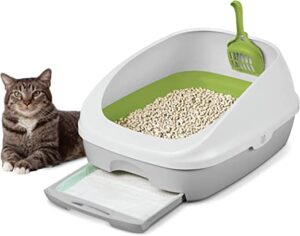Five Common Causes of Your Cat Not Using the Litter Box

Have you ever had this happen? You’re a happy cat owner, your kitty is using the box just fine, but one day…you come home and find a giant urine spot in the living room…the bathroom…heaven forbid – on your bed!
What happened? What went wrong? It isn’t normal for a cat to use her litter box faithfully, then one day decide it’s no longer right for her. There’s always a reason why a cat stops using the litter box. Always.
If this happens to you, don’t panic! The earlier you realize kitty isn’t using her box, the earlier you can stop this problem cold. By careful investigation, you can figure out what’s going on, and how to get kitty to use her litter box again.
Let’s examine 5 common causes that could affect kitty, and the solutions for each.
Medical Condition
Your kitty suddenly stops using the litter box because she’s developed a medical condition. It is most likely crystals in her urine, which form in the bladder, and make urination extremely painful. Kitty associates the urination pain with her litter box, so she continually tries to find a spot in the house that isn’t painful – to her!
The solution – get kitty to the vet as quickly as possible. A course of medication can clear the crystal problem in the short term. A permanent solution is to change your cat’s diet to canned food. Be sure to consult with your vet on large-scale diet changes for your cat.
New House or Residence
Change to a Different Cat Litter
You Change to Litter Box Location
You decided it’s time to move kitty’s box down to the laundry room from the dining room. Kitty is not pleased, so she continues her habit of using the dining room – minus the litter box!
One solution is to find a new location that’s acceptable to both of you. Barring that, you may well have to give in to kitty’s wishes, and put the darn box back where she likes it. It’s certainly cheaper than fighting the battle of cleaning up the urine stains and odor.
I feel your pain on this; my darn cat Scout loves the exercise room as a prime litter box location. I really, really hate it when I’m on the elliptical machine, and Scout has to answer a call of nature that lingers long after she’s vacated the box. Such is life!
A Person Comes to Live With You
If you subscribe to the saying, “Love me, love my cat,” it can be challenging for a new partner if she/he wasn’t a cat person. Discomfort, anger, and resentment can manifest in bad kitty behavior outside the litter box. Your significant other moves in (or you make the move), and the next thing you know, there are presents around the residence you’d rather not have.
You can solve this problem by ensuring that your cat and the other loved one give each a chance to get used to one another. This may entail confining your cat for periods of time, or getting your partner accustomed to cat behavior (climbing on the lap, meowing, sharing the couch, chair, or bed) over a period of time. The worst thing that can happen is for your partner to tease or abuse kitty. This could trigger an inappropriate elimination response.
Anytime your kitty stops using her box for no apparent reason is cause for immediate investigation. If you stop and think about any changes that have occurred in the immediate past, address those first. If you haven’t made any changes, the culprit is most likely a medical condition that can easily be diagnosed and cured by your local kitty vet.
This Article was provided by CatNews.org
Give your cat and kittens a longer and healthier life. Visit CatNews.org
an easy to navigate feline resource site filled with informative articles about cat and kitten health and care.
